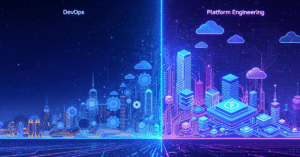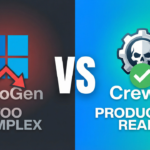
Platform Engineering vs. DevOps: Which Will Dominate the Next Decade?
Table of Contents
Introduction
Over the last decade, DevOps has revolutionized how teams build, ship, and maintain software. By breaking down silos between developers and operations, DevOps made “continuous everything” — integration, testing, delivery — the norm.
But now, a new practice is rapidly gaining traction: Platform Engineering. Some call it the “next evolution of DevOps,” while others see it as an entirely new discipline designed to reduce developer cognitive load and streamline infrastructure management.
Need Fast Hosting? I Use Hostinger Business
This site runs on the Business Hosting Plan. It handles high traffic, includes NVMe storage, and makes my pages load instantly.
Get Up to 75% Off Hostinger →⚡ 30-Day Money-Back Guarantee
So, the question is: Does Platform Engineering replace DevOps, or do the two coexist in the future of agile development? Let’s break this down with insights, comparisons, and practical examples.
What is DevOps, Really?
DevOps emerged in the late 2000s as a response to the “wall of confusion” between developers and IT operations. The idea was simple: integrate development and operations teams to improve collaboration, automate delivery pipelines, and achieve faster time-to-market.
Key principles of DevOps include:
- Automation everywhere – CI/CD pipelines, testing, deployments.
- Collaboration across teams – shared responsibility for product delivery.
- Continuous feedback loops – monitoring and logging to improve future iterations.
- Agility and scalability – respond to customer needs quickly without sacrificing reliability.
But while DevOps solved many problems, it also introduced new ones. For instance, developers often found themselves juggling multiple tools, YAML files, and cloud configurations. This cognitive load slowed them down, which is where Platform Engineering steps in.
What is Platform Engineering?
Platform Engineering is about building and maintaining internal developer platforms (IDPs). These platforms abstract away the complexity of cloud infrastructure, Kubernetes clusters, networking, and security — giving developers a self-service interface to deploy and manage applications without worrying about the underlying details.
Think of it as:
- Developers = Drivers.
- DevOps = Mechanics who prepare the cars.
- Platform Engineers = Builders of an entire racetrack where cars can run smoothly.
Instead of every developer learning Kubernetes, Terraform, and AWS IAM, a platform engineer creates a golden path (or “paved road”) where developers can simply push code and get environments spun up with best practices built-in.
DevOps vs. Platform Engineering: A Side-by-Side Comparison
Here’s a structured comparison:
| Aspect | DevOps | Platform Engineering |
|---|---|---|
| Primary Goal | Bridge development and operations for faster delivery. | Build internal platforms that reduce developer cognitive load. |
| Focus | Processes, collaboration, automation. | Tooling, infrastructure abstraction, developer experience. |
| End Users | Both developers and ops teams. | Primarily developers. |
| Typical Tools | Jenkins, GitLab CI, Ansible, Docker. | Backstage, Crossplane, Internal Portals. |
| Pain Point Solved | Silos, slow release cycles. | Overwhelming complexity, tool fatigue. |
Why Platform Engineering is Rising Now
Three main forces drive Platform Engineering’s popularity:
- Kubernetes Complexity
Kubernetes is powerful but notoriously complex. Platform teams abstract Kubernetes into easy templates for developers. - Developer Productivity Concerns
Too many tools, too many dashboards — developers are exhausted. IDPs let them focus on coding instead of infrastructure. - Scalability in Enterprises
Large organizations need consistency. Platform engineering ensures everyone follows best practices without reinventing the wheel.
Do Companies Need DevOps or Platform Engineering?
Here’s the reality: you need both.
- DevOps is a culture and practice — it ensures collaboration and automation.
- Platform Engineering is an implementation approach — it ensures developers don’t drown in complexity.
In fact, the most successful companies today (Spotify, Netflix, Amazon) use a combination: DevOps culture + Platform teams that build golden paths.
Future Outlook: DevOps + Platform Engineering
Let’s visualize this shift in a simple infographic-style block:
The Future of Agile Development
- ✅ DevOps continues as the cultural backbone.
- ✅ Platform Engineering provides developer self-service portals.
- ✅ Developers focus on innovation, not YAML files.
- ✅ Enterprises adopt hybrid approaches to balance speed and governance.
This hybrid future means developers won’t debate “DevOps vs Platform Engineering” anymore. Instead, they’ll ask: How do we integrate both to achieve velocity, reliability, and happiness for developers?
Human Insight: A Developer’s Perspective
From a developer’s seat, here’s what it feels like:
- With DevOps-only: “I’m spending half my week debugging Helm charts and Terraform scripts instead of writing features.”
- With Platform Engineering: “I push my code, click a button, and my service is deployed in minutes.”
That’s why developers are increasingly demanding paved paths — not because they’re lazy, but because they want to deliver value faster without drowning in infrastructure complexity.
FAQs
Q1. Is Platform Engineering replacing DevOps?
No. Platform engineering complements DevOps. DevOps remains a cultural movement, while platform engineering focuses on infrastructure abstraction.
Q2. What tools are popular for Platform Engineering?
Backstage (by Spotify), Crossplane, Pulumi, Terraform modules, and internal developer portals are commonly used.
Q3. Should startups adopt Platform Engineering early?
Not always. Startups may not need a platform team right away. But as they scale past a dozen developers, platform engineering becomes a productivity multiplier.
Q4. What’s the biggest challenge in adopting Platform Engineering?
The upfront investment. Building internal platforms takes time and resources, but the long-term payoff is huge.
Conclusion
The debate of DevOps vs. Platform Engineering is not a zero-sum game. DevOps laid the foundation by fostering collaboration and automation, while Platform Engineering builds on it by giving developers a smoother, less stressful way to ship software.
As agile development continues to evolve, companies that embrace DevOps culture and platform-driven tooling will unlock the true potential of their teams.
👉 If you want daily updates and PDF, then subscribe to our newsletter.
The future isn’t about choosing one side — it’s about combining both to create a world where developers focus on innovation, not infrastructure.

🚀 Let's Build Something Amazing Together
Hi, I'm Abdul Rehman Khan, founder of Dev Tech Insights & Dark Tech Insights. I specialize in turning ideas into fast, scalable, and modern web solutions. From startups to enterprises, I've helped teams launch products that grow.
- ⚡ Frontend Development (HTML, CSS, JavaScript)
- 📱 MVP Development (from idea to launch)
- 📱 Mobile & Web Apps (React, Next.js, Node.js)
- 📊 Streamlit Dashboards & AI Tools
- 🔍 SEO & Web Performance Optimization
- 🛠️ Custom WordPress & Plugin Development





